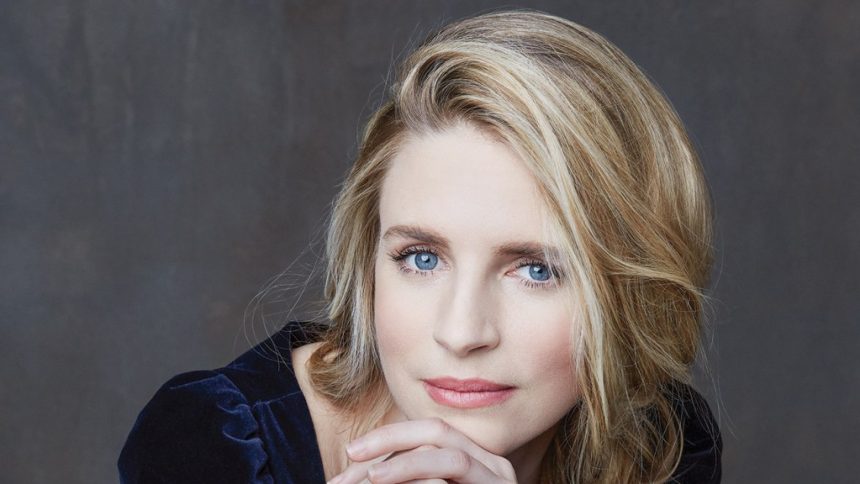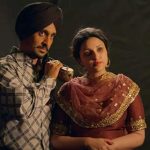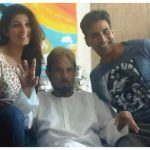When Brit Marling and her longtime collaborator Zal Batmanglij came up with the idea for their latest series, A Murder at the End of the World, it was the very first time that every network they pitched wanted to make it. At the time, early in the pandemic, they were riding off of the high of the widespread success of The OA, and simultaneously grappling with Netflix’s shocking decision to cancel the series after just two seasons. “One thing I’ve realized about making work in this business is that if you’re putting a piece of yourself and your heart on the line, you have to accept that there are forces larger than you that are going to shape things,” says Marling. “The cancellation was a profound experience because it made me realize the only thing you can do is choose people you believe in.”
The show, which follows hacker Darby Hart (played by Emma Corrin) who finds herself at a billionaire’s climate crisis retreat as her fellow attendees start dying off one by one, eventually landed at FX, where Marling felt the execs “gave a shit about stories and would work hard to protect them.” Here, she discusses her WGA-nominated work and the existential discussions it’s spurred.
How do you look for collaborators? It feels notable that there were two authors in the writers room of A Murder at the End of the World.
We came from the feature filmmaking world before The OA and we’d never been in writer’s rooms. We mapped out the story we were going to tell, that was seven or eight hours long, so we didn’t need a room to break the story — it was almost like taking a novel and using the room to adapt it to the screen. I’ve also always tried to find writers outside of Hollywood. When we were making The OA I had read a play that Dominic Orlando wrote about mental illness that was so beautiful and deeply felt, and he was living in Minnesota and had never written anything for the screen. We called him up and he got on a plane. On Murder, Rebecca Roanhorse and Cherie Dimaline are both science fiction authors who hadn’t written anything for the screen. I think it creates a really amazing energy to bring in people who aren’t jaded or trained in the politics of a writers room and how to behave in that hierarchy. It can be more like a summer camp.
Do you feel jaded?
I’ve been thinking about it a lot lately, and I do feel like it’s cyclical. [This industry] can feel like you’re in a locked room with no way out. There’s no doors, no windows, and you’re just in the dark feeling up against the walls. Every time it gets like that, somebody punches a hole in the wall, and carves out a window, and for a period of time all this energy and vitality in storytelling reemerges. Like in the early streaming era, where for a moment advertising dollars weren’t shaping what the stories required; those projects didn’t have to sell Tide or diapers but could just exist. So there was an incredible freedom in making The OA. I think that window has closed, but the energy is starting to get pent up again and somebody will punch through that wall again and we’ll all flood the new opening. I feel like creativity always finds a way — or at least I’ve trained myself to think that way because otherwise it’d be hard to get out of bed.
Something Greta Gerwig has talked about it the idea that she used to write these lofty scripts and felt soothed knowing it was the director’s job to figure out how to execute — and with Barbie she realized oh, crap, it’s my job. Did you feel anything similar on this show?
Oh, completely. There were sequences where I would turn to Zal and be like, why did we write this in a remote, far-flung location where we’re in a blizzard all the time? I remember repelling down into this ravine — if you fall, I don’t think you’d make it out. There are some pretty extreme locations on this show, and they don’t look nearly as dangerous on film as they felt when we were there. I was like, why didn’t we set this in the Maldives? (Laughs)
I imagine that making this show, with its many warnings about the climate crisis, felt a little cathartic — but I also think that being so constantly confronted by all the perils of the crisis could induce a bit of a panic…
In some ways the process of telling this story and living those experiences made me, oddly, more hopeful. In doing all the research and meeting people, I did see how people are taking more accountability and things are happening even if it isn’t the center of the story in what gets reported. And I came to see nature as so abundant and generative — if we humans just take a step back and facilitate that, there’s so much healing that can happen. We really wanted to talk about the ways Andy’s fear of the climate crisis resulted in his hoarding of resources, and creating a tech fiefdom, which is turning out to be something that many people are doing in the real world. People are thinking about themselves, and their families, and that’s the opposite of the energy that we need. We need to build community and model resistance together. We’re not impotent, we can still change our values and how we think about things.
Brit Marling, as reclusive hacker Lee Anderson, with Emma Corrin (who plays Darby Hart) in FX’s A Murder at the End of the World.
Chris Saunders/FX
Given how it seems like The OA is still a living, breathing thing for you, I’m curious: When did you truly feel “finished” with A Murder at the End of the World?
Once the promotional lap of the marathon that is releasing a show starts to die down, that’s when new stories start to enter. I can always tell when that happens because I’ll wake up at three in the morning with the edge of a dream or an idea, and I’ll be on my laptop trying to write it down before I lose track of what it was. There’s a feature I’m working on right now and it just sort of tumbled out within a week. I think those ideas tend to come from the unconscious, it almost feels like a flash of a flash flood — there’s a download, for lack of a better work, and you’re trying to write fast enough to get it before it leaves you.
Did any part of the story of A Murder at the End of the World come to you like that?
I think it was the love story between Bill and Darby. That came as a wave. I never had to think about those sections. It was this feeling of being on a road trip and falling in love, and the brightness and openness of your first love — and for that to be happen while you’re simultaneously unraveling a cold case of a serial killer. That marriage between light and dark just felt so intuitive. One scene that really tumbled out was when he leaves her in the car and walks out into the desert and she follows him eventually, and they have that conversation about the ways that their passion for amateur sleuthing, and their love, is being shaped by technology. That scene felt effortless.
The first time I watched the series, I didn’t have any background info on it and hadn’t seen a trailer or anything — I remember those early love scenes felt very timeless, and not-current in a good way. That scene sort of jarred me into realizing it was current-day, because they were arguing about smartphones.
I think their love story does have this quality where it could have been the twenties or the sixties. Maybe part of that is being out in the Badlands, and the American road trip is sort of iconic imagery. I also think when we watch a first-love story we put ourselves into it, and you think about the time you had your first fight with the person you were madly in love with or the first time someone really broke your heart. We were hoping for sort of a mythic timeline, but it’s difficult to achieve, so it’s nice to hear that. I also think Emma Corrin and Harris Dickinson are such incredible actors that really found something together on screen every day.
Did the characters morph at all once Emma and Harris were attached? How does the version we see onscreen differ from what was originally written?
A lot of the things I’ve written, I’ve written for myself to perform, and that has an interesting effect on what I’m writing. I don’t always give myself that much permission to explore — when Zal and I made Sound of My Voice together, that character is quite cruel and intense, and while I definitely have that capacity in myself I don’t go there that often. I knew in this experience that I didn’t want to play the lead because I wanted to focus more completely on directing. Initially we’d been trying to slot actors in, in our minds, and then I read something about how if you write with an actor in mind you often substitute that actor’s charisma for actually getting it right on the page. You’re borrowing their supernova energy and being like, well, it’ll be great when they do it. Then when we met with Emma for the first time, we were so moved by their preternatural gravitas and depth, especially for someone so young.
As you prepared to release the show, did you have any particular anticipations or hopes for what success was going to mean? What feels good to you for the life of a series?
What’s so amazing about this question is that nobody in this business knows how to define a success anymore. We literally don’t know. They’re not making anything that matches up financially. We don’t know how many people need to watch something on Hulu to make it matter. It’s very interesting operating in a medium where the financial model is broken and the strikes did not resolve — neither Wall Street nor any of the executives seem to know how to fix it and it’s the elephant in the room. It’s also freeing, because you really do have to ask yourself, what is success on your terms? People call The OA a cult show all the time, which I think is funny because the numbers were so huge at the beginning. Tens of millions of people is not really a cult following. But for me, with this new show, it’s about what do I feel emotionally when I talk to people? When you said at the start of this conversation that you went into a screening with no information, no marketing materials, you didn’t know what the fuck you were getting into and you stayed for five episodes and then came back the next day — to me, it never gets any better than hearing that. If something entered you and moved you I’m like, well fuck. We did our job.
Fans seem to want to talk to you about your work — what sort of pressure do you feel to be part of that feedback loop?
I’m probably not the best at that sort of engagement that I see some of my peers — and certainly people who are younger — doing. I don’t have the most organic relationship with social media. But I do feel people’s love of the shows coming through, and that part feels organic and genuine. The fans of The OA who ask for more of the show, they do it with such sincerity and we want to give that to them. I think if the forces align and things inside the industry create a window for that, my God, we would totally serve the rest of the story through. Maybe that can come to pass. I don’t mind people still asking for that. I’ll say that I’m also sort of shy, so while I’m good at one-on-one conversations, I’m not as good at the other aspects [of fandom] and I wish I was better.
It’s probably protecting you, in the end. I’m sure we’ve both seen and met people, especially in this business, who have trouble separating validation online from the real world. It’s a slippery slope.
I have a friend who’s a really talented writer, who wrote something that was controversial and got a real backlash online. They were overwhelmed, but the crazy thing is it’s like a portal. You and I could just close our laptops right now and it doesn’t exist. It’s not like you go to the grocery store and everyone turns around, like, ‘it’s the person who wrote that essay!’ In the digital marketplace of ideas a very small number of people can sound like they’re a hundred thousand people in the town square screaming and throwing vegetables. And I don’t know how to make art that isn’t going to piss off at least 10% of the audience — the only art I’m interested in telling is hopefully too subversive or too feminist or too critical of the system to not engender some part of the audience to have a, who-do-they-think-they-are attitude. Which we get a lot of.
Are you a superfan of anything?
Do you want to hear one that is so random? I can’t believe how random it is. My partner and I were in a really rural part of Kansas for a period, seeing family, and at night there wasn’t anything to do. He suggested putting on ER, the medical show from the nineties, because he used to watch it with his mom and I’d never seen it. This sounds dumb to say because of course it was a huge hit show, but I’d never seen it, and the pilot was so good and we binged through the first season. Now I’m a huge fan. But I would also say that my most genuine long-term fandom is Miyazaki. When they do retrospectives I’ll drive to Santa Monica in traffic just to see it.
I saw Maura Tierney in a coffee shop recently and it was the most excited I’ve been in a long time.
I totally get that. I could see the biggest movie star and be nonplussed, but then get really starstruck over something so specific. Something I’ve done a lot with people is write a little note and just slip it to them. I don’t ever know how to tell someone that I love their work in a way that doesn’t feel like I’m trying to get something out of the encounter. I once wrote Iñárritu a note at Cannes on a paper tablecloth covered in mustard stains from a sandwich.
Final question. Do you think it’s possible for people to get really rich and still be a good person? Is there such a thing as a moral billionaire?
I don’t know that I could ever have a fully formed answer, but I’ll tell you where I’m at today with this. I remember reading an essay in college about Marilyn Monroe and the study of situational narcissism. It made the argument that when you’re so famous, none of your encounters can be truly human because of how everyone treats you. It changes how you are with the world and it’s not even fully your fault in some ways. I feel that about the idea of people with billions. They have so much of the world’s resources, and every interaction they have is complicated by the fact that they’re always more powerful than the person they’re interacting with. I’d love to think that there are some contributions to our world that is worth that amount, but it just isn’t true. I don’t think you can maintain your full humanity from a place of power that extreme.
This story first appeared in the April 10 issue of The Hollywood Reporter magazine. Click here to subscribe.












